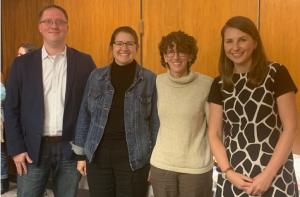By Samantha Avina When the idea of non-profit organizations come to mind it is most often associated with thoughts of fundraising and philanthropic work for the better of humanity. Although accompanied by these great attributes, non-profit work doesn’t automatically call attention of the lone Ph.D. candidate doing niche specific benchwork. So, how does the idea of the non-profit sector and their increasing need for Ph.D. holders go hand in hand? With that in mind, on November 6th, iJobs hosted the non-profit panel event at the Rutgers Piscataway campus. Panelists from different non-profit organizations gathered to discuss Ph.D. recruitment in the field and what skillsets these organizations are searching for during the hiring process. As the trend of Ph.D. holders looking for non-academic jobs continues to increase, those in the non-profit field are casting their recruitment net to Ph.D’s now more than ever. Panelists, Dr. Sean Sullivan and Sarah Sprott, came as representatives of The Helmsley Charitable Trust , a self-funded non-profit organization dedicated to supporting research efforts in a variety of health disparity fields. Dr. Sullivan is the Senior Program Officer for the Type I diabetes project at Helmsley. He described his desire to help others in combination with wanting to explore careers outside academia as attributes to his change of career path. “Non-profit was not something I initially thought about but seeing how I could directly help people when I talk to top researchers and companies and find out new research projects that directly help people, that’s the fulfillment I get at Helmsley”, said Dr. Sullivan. [caption id="attachment_3046" align="aligncenter" width="438"] Image source: https://www.nonprofitexpert.com/about/[/caption] Human resources manager Sarah Sprott, who is directly involved in the hiring process at Helmsley, emphasized the important skillsets Ph.D. students attain through their training that make them desirable candidates that thrive in this field. “What we are really looking for in the hiring process are skillsets that show us you can speak confidently and answer unexpected questions while presenting information in a clear, concise, and professional manner. We try to see how you can bring a different perspective to the team with the breadth of knowledge that we know Ph.D.s have”, said Sarah.
Image source: https://www.nonprofitexpert.com/about/[/caption] Human resources manager Sarah Sprott, who is directly involved in the hiring process at Helmsley, emphasized the important skillsets Ph.D. students attain through their training that make them desirable candidates that thrive in this field. “What we are really looking for in the hiring process are skillsets that show us you can speak confidently and answer unexpected questions while presenting information in a clear, concise, and professional manner. We try to see how you can bring a different perspective to the team with the breadth of knowledge that we know Ph.D.s have”, said Sarah.
As the trend of Ph.D. holders looking for non-academic jobs continues to increase, those in the non-profit field are casting their recruitment net to Ph.Ds now more than ever.
These professional traits are sought from Ph.D.’s not only at large non-profit organizations like Helmsley, but across all organizations even at the grassroots level. Panelist Dr. Alycia Halladay, who is the Chief Science Officer at the Autism Science Foundation (ASF) and Rutgers Alumni, has worked at different non-profit organizations and agrees Ph.D. holders are highly sought candidates in her field. More than solely emphasizing desired skillsets, Dr. Halladay drove home the importance of Ph.D. students taking advantage of different opportunities that may arise during their training that can pave the way for more career opportunities in the future. “Always seek opportunities to work with other people whether its joining a committee, doing a collaboration with another lab, or writing a grant…you don’t know where it will lead you and those things will really make your application stand out”, said Dr. Halladay when asked how she got involved in non-profit work.
"Always seek opportunities to work with other people whether its joining a committee, doing a collaboration with another lab, or writing a grant…you don’t know where it will lead you and those things will really make your application stand out"
ASF is a smaller non-profit that depends primarily on donors to fund its initiatives unlike Helmsley which is self-funded, and this brought up another series of topics on the panel regarding job security and salary. Each panelist had different responses to these topics but concluded across the board that things like job security and salary depended on highly variable factors including the size of the organization and your experience when entering the job market. [caption id="attachment_3045" align="aligncenter" width="376"] November 6th, 2019 iJobs Non-profit Panelists (From left to right): Dr. Sean Sullivan Helmsley SPO, Dr. Alycia Halladay Autism Science Foundation CSO, Dr. Jane Adler panel moderator, Sarah Sprott Helmsley HR manager.[/caption] In Helmsley’s case, because they are self-funded and have great investment teams that ensure monetary investments continue to increase, job stability is relatively a non-issue including benefits like paid maternal and paternal healthcare. At smaller organizations, such as ASF, who are relatively new and depend primarily on donations, each project and the allotted resources set toward that project are determined at the beginning of every year so that project funding is not a major area of concern but can still vary from year to year. Salaries for Ph.D. holders in the non-profit also vary with an entry level position ranging from 65-80K a year depending on experience garnered during your training including publications, post-doctoral positions, and prior industry experience. The non-profit panel event lasted approximately an hour and a half with the first session focused on moderated questions directed toward the panelists and the second portion focused on an interactive activity. In the interactive portion audience members broke off into groups to discuss a prompt of questions formulated by the panelists meant to simulate situations often presented to those in the non-profit sector. These questions touched on different components of non-profit work ranging from ethical conduct vs donor interests, to handling of misconstrued scientific information streamlined to the public. By giving the audience the opportunity to simulate handling these situations, the audience got an even better understanding of the communication, professionalism, and networking skills needed to be successful in the non-profit sector. These are skills that Ph.D.’s candidates have literally been trained for.
November 6th, 2019 iJobs Non-profit Panelists (From left to right): Dr. Sean Sullivan Helmsley SPO, Dr. Alycia Halladay Autism Science Foundation CSO, Dr. Jane Adler panel moderator, Sarah Sprott Helmsley HR manager.[/caption] In Helmsley’s case, because they are self-funded and have great investment teams that ensure monetary investments continue to increase, job stability is relatively a non-issue including benefits like paid maternal and paternal healthcare. At smaller organizations, such as ASF, who are relatively new and depend primarily on donations, each project and the allotted resources set toward that project are determined at the beginning of every year so that project funding is not a major area of concern but can still vary from year to year. Salaries for Ph.D. holders in the non-profit also vary with an entry level position ranging from 65-80K a year depending on experience garnered during your training including publications, post-doctoral positions, and prior industry experience. The non-profit panel event lasted approximately an hour and a half with the first session focused on moderated questions directed toward the panelists and the second portion focused on an interactive activity. In the interactive portion audience members broke off into groups to discuss a prompt of questions formulated by the panelists meant to simulate situations often presented to those in the non-profit sector. These questions touched on different components of non-profit work ranging from ethical conduct vs donor interests, to handling of misconstrued scientific information streamlined to the public. By giving the audience the opportunity to simulate handling these situations, the audience got an even better understanding of the communication, professionalism, and networking skills needed to be successful in the non-profit sector. These are skills that Ph.D.’s candidates have literally been trained for.
Salaries for Ph.D. holders in the non-profit also vary with an entry level position ranging from 65-80K a year depending on experience garnered during your training including publications, post-doctoral positions, and prior industry experience.
The non-profit career path has been a hidden gem of the Ph.D. job market that has not been promoted to the same extent as professorship or industry, yet often leads to a fulfilling and successful career path. As the era of non-academic Ph.D. careers continues to gain momentum, organizations like Helmsley and ASF are actively seeking Ph.D. holders to apply for project design and leadership positions because their training, regardless of the field, has enabled them to succeed in these positions. Sometimes we forget, through the monotony of failed experiments and constant deadlines, that our time as a Ph.D. is more than just an accumulation of technical skills but is an actual degree in being able to think critically, manage time effectively and solve complex problems in any environment. So, if you are interested in using your skills for a greater cause with direct impact on people this may be the career path for you and the job market will be waiting for your application with open arms. This article was edited by Emily Kelly Castro and Helena Mello